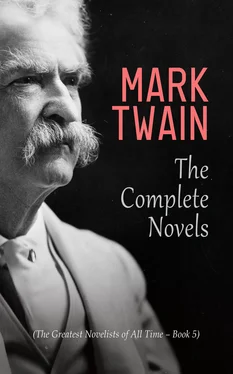In due course the superintendent stood up in front of the pulpit, with a closed hymn-book in his hand and his forefinger inserted between its leaves, and commanded attention. When a Sunday-school superintendent makes his customary little speech, a hymn-book in the hand is as necessary as is the inevitable sheet of music in the hand of a singer who stands forward on the platform and sings a solo at a concert—though why, is a mystery: for neither the hymn-book nor the sheet of music is ever referred to by the sufferer. This superintendent was a slim creature of thirty-five, with a sandy goatee and short sandy hair; he wore a stiff standing-collar whose upper edge almost reached his ears and whose sharp points curved forward abreast the corners of his mouth—a fence that compelled a straight lookout ahead, and a turning of the whole body when a side view was required; his chin was propped on a spreading cravat which was as broad and as long as a bank-note, and had fringed ends; his boot toes were turned sharply up, in the fashion of the day, like sleigh-runners—an effect patiently and laboriously produced by the young men by sitting with their toes pressed against a wall for hours together. Mr. Walters was very earnest of mien, and very sincere and honest at heart; and he held sacred things and places in such reverence, and so separated them from worldly matters, that unconsciously to himself his Sunday-school voice had acquired a peculiar intonation which was wholly absent on week-days. He began after this fashion:
"Now, children, I want you all to sit up just as straight and pretty as you can and give me all your attention for a minute or two. There—that is it. That is the way good little boys and girls should do. I see one little girl who is looking out of the window—I am afraid she thinks I am out there somewhere—perhaps up in one of the trees making a speech to the little birds. [Applausive titter.] I want to tell you how good it makes me feel to see so many bright, clean little faces assembled in a place like this, learning to do right and be good." And so forth and so on. It is not necessary to set down the rest of the oration. It was of a pattern which does not vary, and so it is familiar to us all.
The latter third of the speech was marred by the resumption of fights and other recreations among certain of the bad boys, and by fidgetings and whisperings that extended far and wide, washing even to the bases of isolated and incorruptible rocks like Sid and Mary. But now every sound ceased suddenly, with the subsidence of Mr. Walters' voice, and the conclusion of the speech was received with a burst of silent gratitude.
A good part of the whispering had been occasioned by an event which was more or less rare—the entrance of visitors: lawyer Thatcher, accompanied by a very feeble and aged man; a fine, portly, middle-aged gentleman with iron-gray hair; and a dignified lady who was doubtless the latter's wife. The lady was leading a child. Tom had been restless and full of chafings and repinings; conscience-smitten, too—he could not meet Amy Lawrence's eye, he could not brook her loving gaze. But when he saw this small newcomer his soul was all ablaze with bliss in a moment. The next moment he was "showing off" with all his might—cuffing boys, pulling hair, making faces—in a word, using every art that seemed likely to fascinate a girl and win her applause. His exaltation had but one alloy—the memory of his humiliation in this angel's garden—and that record in sand was fast washing out, under the waves of happiness that were sweeping over it now.
The visitors were given the highest seat of honor, and as soon as Mr. Walters' speech was finished, he introduced them to the school. The middle-aged man turned out to be a prodigious personage—no less a one than the county judge—altogether the most august creation these children had ever looked upon—and they wondered what kind of material he was made of—and they half wanted to hear him roar, and were half afraid he might, too. He was from Constantinople, twelve miles away—so he had travelled, and seen the world—these very eyes had looked upon the county court-house—which was said to have a tin roof. The awe which these reflections inspired was attested by the impressive silence and the ranks of staring eyes. This was the great Judge Thatcher, brother of their own lawyer. Jeff Thatcher immediately went forward, to be familiar with the great man and be envied by the school. It would have been music to his soul to hear the whisperings:
"Look at him, Jim! He's a going up there. Say—look! he's a going to shake hands with him—he is shaking hands with him! By jings, don't you wish you was Jeff?"
Mr. Walters fell to "showing off," with all sorts of official bustlings and activities, giving orders, delivering judgments, discharging directions here, there, everywhere that he could find a target. The librarian "showed off"—running hither and thither with his arms full of books and making a deal of the splutter and fuss that insect authority delights in. The young lady teachers "showed off"—bending sweetly over pupils that were lately being boxed, lifting pretty warning fingers at bad little boys and patting good ones lovingly. The young gentlemen teachers "showed off" with small scoldings and other little displays of authority and fine attention to discipline—and most of the teachers, of both sexes, found business up at the library, by the pulpit; and it was business that frequently had to be done over again two or three times (with much seeming vexation). The little girls "showed off" in various ways, and the little boys "showed off" with such diligence that the air was thick with paper wads and the murmur of scufflings. And above it all the great man sat and beamed a majestic judicial smile upon all the house, and warmed himself in the sun of his own grandeur—for he was "showing off," too.
There was only one thing wanting to make Mr. Walters' ecstasy complete, and that was a chance to deliver a Bible-prize and exhibit a prodigy. Several pupils had a few yellow tickets, but none had enough—he had been around among the star pupils inquiring. He would have given worlds, now, to have that German lad back again with a sound mind.
And now at this moment, when hope was dead, Tom Sawyer came forward with nine yellow tickets, nine red tickets, and ten blue ones, and demanded a Bible. This was a thunderbolt out of a clear sky. Walters was not expecting an application from this source for the next ten years. But there was no getting around it—here were the certified checks, and they were good for their face. Tom was therefore elevated to a place with the Judge and the other elect, and the great news was announced from headquarters. It was the most stunning surprise of the decade, and so profound was the sensation that it lifted the new hero up to the judicial one's altitude, and the school had two marvels to gaze upon in place of one. The boys were all eaten up with envy—but those that suffered the bitterest pangs were those who perceived too late that they themselves had contributed to this hated splendor by trading tickets to Tom for the wealth he had amassed in selling whitewashing privileges. These despised themselves, as being the dupes of a wily fraud, a guileful snake in the grass.
The prize was delivered to Tom with as much effusion as the superintendent could pump up under the circumstances; but it lacked somewhat of the true gush, for the poor fellow's instinct taught him that there was a mystery here that could not well bear the light, perhaps; it was simply preposterous that this boy had warehoused two thousand sheaves of Scriptural wisdom on his premises—a dozen would strain his capacity, without a doubt.
Amy Lawrence was proud and glad, and she tried to make Tom see it in her face—but he wouldn't look. She wondered; then she was just a grain troubled; next a dim suspicion came and went—came again; she watched; a furtive glance told her worlds—and then her heart broke, and she was jealous, and angry, and the tears came and she hated everybody. Tom most of all (she thought).
Читать дальше












